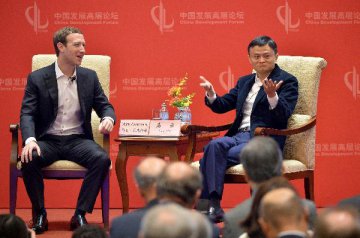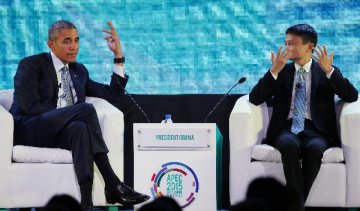
Jack Ma, founder of Alibaba, on Wednesday called for a fresh global e-commerce platform to accommodate the interests of small traders who have been enabled by e-commerce to buy and sell across borders.
Speaking at the Boao Forum for Asia in the southern province of Hainan, Ma said it calls for an Electronic World Trade Platform, or e-WTP, to enable small and medium enterprises that had been largely left out of the free trade regime of the world in the past.
"In the Internet Age, we need trade platforms that are more open, fairer and freer," Ma said. "We need to go back to trade itself. It is not an organization. It is not a negotiation. It is just a platform to enable the small and medium enterprises and the consumers of the world, especially the young," he added.
Ma did not specify details of the rules for the platform, but customs and tax procedures are the main barriers to cross-border e-commerce. Ma said the e-WTP he envisages will better connect small and medium enterprises through logistics and inclusive financing, thereby, offering 80 percent of those not engaged at the current time to participate in trade.
He said the free trade regime represented by the World Trade Organization (WTO) has largely benefited large corporations and multinationals, the top 20 percent, while small and medium enterprises and the young in developing countries are left behind.
"Trade blocs are often used to advance protectionism rather than as enablers," he said, citing weak global trade growth. "Trade is the best way for people across the world to communicate with each other. No matter if you like it or not, an age of new trade has come," Ma added.
Speaking in the panel discussion, Long Yongtu, former vice minister for trade and a top trade negotiator, said the globalization process is not losing steam. Long said industrial restructuring, driven by technological advancement, was changing the process of globalization, and new momentum will be created as more industries "go digital."
"The global allocation of resources in the past largely benefited developed economies and multinationals. In the Internet Age, we need to update the trade rules so more people benefit," Long said.
Luis Alberto Moreno, president of the Inter-American Development Bank, said the free trade regimes of the world were problematic and businesses should play a bigger role. Kasper Jacobson, chief executive officer of Mead Johnson Nutrition, said it was important to eliminate geographical discrimination.
Indonesian Trade Minister Tom Lembong said the e-WTP proposed by Jack Ma reflected the shortcomings of the current world free trade regime and it might play a part in solving trade protectionism.
Ma said the new platform will not replace the WTO, but rather, complement the existing free trade regime. Overall trade will continue to grow. He said it was a pressing task, to establish the e-WTP, as the pace of doing business in the Internet Age is much faster than in the past when free trade talks could take years to conclude. He said he will try to raise the e-WTP topic to the G20 meetings.
China will play host to G20 leaders in September this year in Hangzhou, where the Alibaba Group, led by Ma, is headquartered. Long said the stakeholders, including businesses, governments and civil society should be included in the creation of the e-WTP.
Multilateral organizations have done some ground work to formulate global rules for e-commerce, but that the government still has a role to play, with the possibility of an institution or even a secretariat being established for the e-WTP. It would be good if the concept can eventually become part of the global trade protocols like the WTO, he said.




















Latest comments